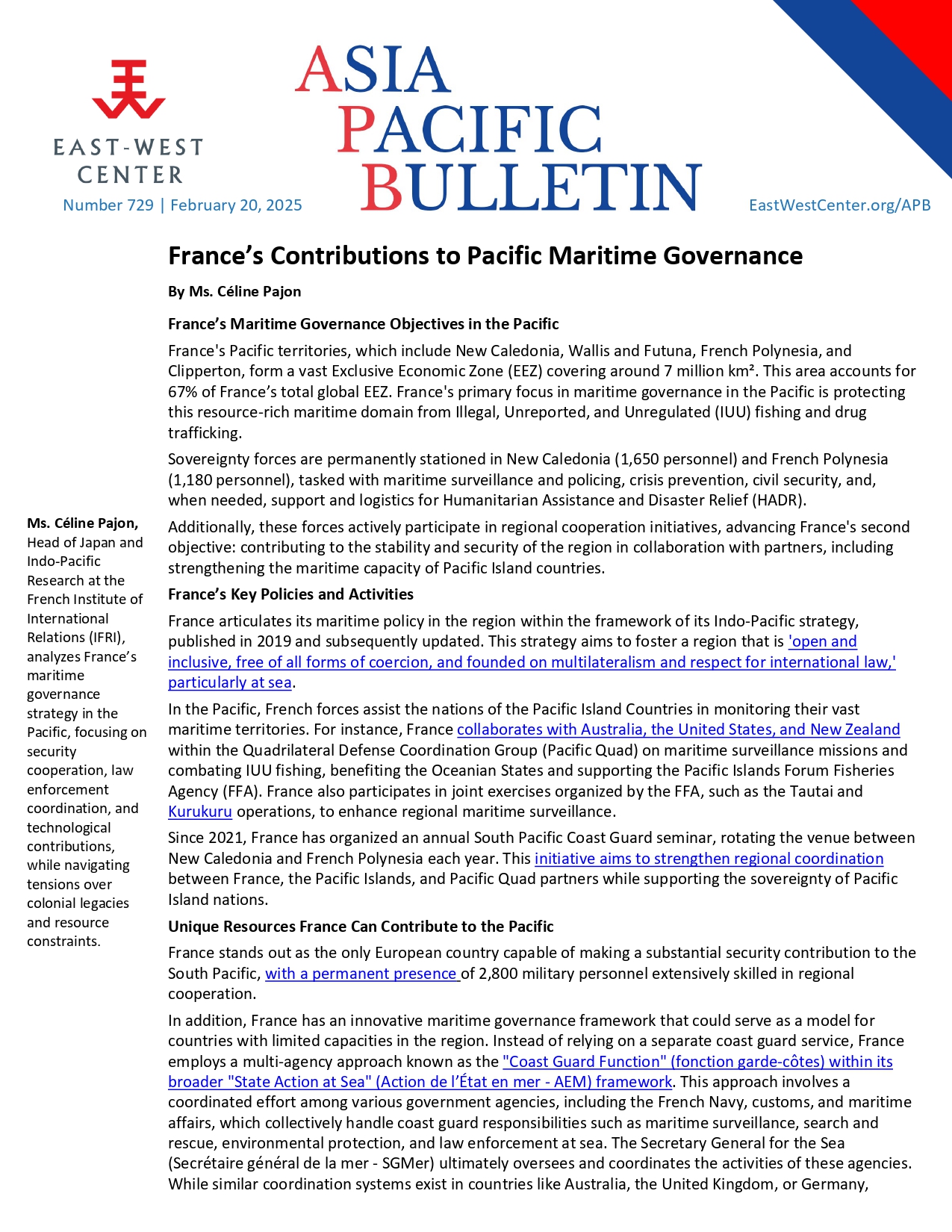France’s Contributions to Pacific Maritime Governance

France stands out as the only European country capable of making a substantial security contribution to the South Pacific, with a permanent presence of 2,800 military personnel extensively skilled in regional cooperation.
France’s Maritime Governance Objectives in the Pacific
France's Pacific territories, which include New Caledonia, Wallis and Futuna, French Polynesia, and Clipperton, form a vast Exclusive Economic Zone (EEZ) covering around 7 million km². This area accounts for 67% of France’s total global EEZ. France's primary focus in maritime governance in the Pacific is protecting this resource-rich maritime domain from Illegal, Unreported, and Unregulated (IUU) fishing and drug trafficking.
Sovereignty forces are permanently stationed in New Caledonia (1,650 personnel) and French Polynesia (1,180 personnel), tasked with maritime surveillance and policing, crisis prevention, civil security, and, when needed, support and logistics for Humanitarian Assistance and Disaster Relief (HADR).
Additionally, these forces actively participate in regional cooperation initiatives, advancing France's second objective: contributing to the stability and security of the region in collaboration with partners, including strengthening the maritime capacity of Pacific Island countries.
France’s Key Policies and Activities
France articulates its maritime policy in the region within the framework of its Indo-Pacific strategy, published in 2019 and subsequently updated. This strategy aims to foster a region that is 'open and inclusive, free of all forms of coercion, and founded on multilateralism and respect for international law,' particularly at sea.
In the Pacific, French forces assist the nations of the Pacific Island Countries in monitoring their vast maritime territories. For instance, France collaborates with Australia, the United States, and New Zealand within the Quadrilateral Defense Coordination Group (Pacific Quad) on maritime surveillance missions and combating IUU fishing, benefiting the Oceanian States and supporting the Pacific Islands Forum Fisheries Agency (FFA). France also participates in joint exercises organized by the FFA, such as the Tautai and Kurukuru operations, to enhance regional maritime surveillance.
Since 2021, France has organized an annual South Pacific Coast Guard seminar, rotating the venue between New Caledonia and French Polynesia each year. This initiative aims to strengthen regional coordination between France, the Pacific Islands, and Pacific Quad partners while supporting the sovereignty of Pacific Island nations.
[...]
>Read the entire article on the website of the East-West Center : Céline Pajon, "France’s Contributions to Pacific Maritime Governance", Asia Pacific Bulletin, Number 729, East-West Center, February 20, 2025.
Texte citation
France’s maritime governance approach leverages its overseas territories, advanced surveillance capabilities, and regional partnerships to maintain security and support Pacific Island nations.

Research Fellow, Head of Japan and Indo-Pacific Research, Center for Asian Studies, Ifri

Available in:
Themes and regions
Share
Download the full analysis
This page contains only a summary of our work. If you would like to have access to all the information from our research on the subject, you can download the full version in PDF format.
France’s Contributions to Pacific Maritime Governance
Related centers and programs
Discover our other research centers and programsFind out more
Discover all our analysesIndia’s Green Hydrogen Strategy in Action: Policy Actions, Market Insights, and Global Opportunities
India is poised to remain the world’s fastest-growing major economy, and this rapid growth is driving a sharp rise in energy demand. As the most populous country on the planet, India urgently needs to decarbonize its energy systems.

RAMSES 2024. A World to Be Remade
For its 42nd edition, RAMSES 2024 identifies three major challenges for 2024.

France and the Philippines should anchor their maritime partnership
With shared interests in promoting international law and sustainable development, France and the Philippines should strengthen their maritime cooperation in the Indo-Pacific. Through bilateral agreements, expanded joint exercises and the exchange of best practices, both nations can enhance maritime domain awareness, counter security threats and develop blue economy initiatives. This deeper collaboration would reinforce stability and environmental stewardship across the region.

The China-led AIIB, a geopolitical tool?
The establishment of the Asian Infrastructure Investment Bank (AIIB) in 2016, on a Chinese initiative, constituted an attempt to bridge the gap in infrastructure financing in Asia. However, it was also perceived in the West as a potential vehicle for China’s geostrategic agendas, fueling the suspicion that the institution might compete rather than align with existing multilateral development banks (MDBs) and impose its own standards.







